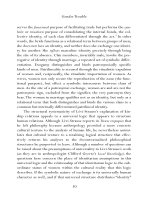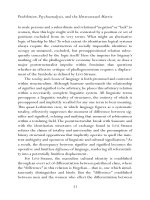GENDER TROUBLE 153
Bạn đang xem bản rút gọn của tài liệu. Xem và tải ngay bản đầy đủ của tài liệu tại đây (20.41 KB, 1 trang )
Gender Trouble
rather, as an effect or consequence of a system of sexuality in which the
female body is required to assume maternity as the essence of its self
and the law of its desire.
If we accept Foucault’s framework, we are compelled to redescribe the maternal libidinal economy as a product of an historically
specific organization of sexuality. Moreover, the discourse of sexuality,
itself suffused by power relations, becomes the true ground of the
trope of the prediscursive maternal body. Kristeva’s formulation suffers a thoroughgoing reversal: The Symbolic and the semiotic are no
longer interpreted as those dimensions of language which follow upon
the repression or manifestation of the maternal libidinal economy.This
very economy is understood instead as a reification that both extends
and conceals the institution of motherhood as compulsory for women.
Indeed, when the desires that maintain the institution of motherhood
are transvaluated as pre-paternal and pre-cultural drives, then the
institution gains a permanent legitimation in the invariant structures
of the female body. Indeed, the clearly paternal law that sanctions and
requires the female body to be characterized primarily in terms of its
reproductive function is inscribed on that body as the law of its natural
necessity. Kristeva, safeguarding that law of a biologically necessitated
maternity as a subversive operation that pre-exists the paternal law
itself, aids in the systematic production of its invisibility and, consequently, the illusion of its inevitability.
Because Kristeva restricts herself to an exclusively prohibitive conception of the paternal law, she is unable to account for the ways in
which the paternal law generates certain desires in the form of natural
drives. The female body that she seeks to express is itself a construct
produced by the very law it is supposed to undermine. In no way do
these criticisms of Kristeva’s conception of the paternal law necessarily invalidate her general position that culture or the Symbolic is predicated upon a repudiation of women’s bodies. I want to suggest,
however, that any theory that asserts that signification is predicated
upon the denial or repression of a female principle ought to consider
118









